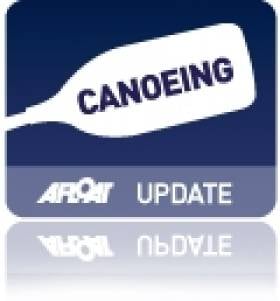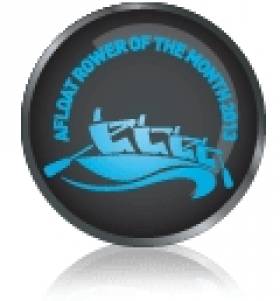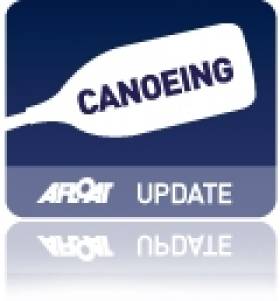Displaying items by tag: bronze
#CANOEING: Jenny Egan brought Ireland a first senior medal at the European Canoe Sprint Championships when she took bronze in the Women’s K1 5,000 metres in Racice in the Czech Republic today. Egan, from the Salmon Leap club in Leixlip, was part of a successful breakaway at 1,000 metres with Maryna Litvinchuk of Belarus, who took gold, and Irene Burgo of Italy, the silver medallist. Less than two-thirds of a second divided the three.
Ireland paracanoeist Patrick O’Leary finished fourth in his KL3 200 metre final. Robert Oliver of Britain took gold. O’Leary was just a third off a second of taking bronze.
European Canoe Sprint Championships, Racice, Czech Republic (Selected Results; Irish interest)
Saturday
Men
K2 200 – Heat Three (First Three to A Final; 4-7 to B Final; rest out): 1 Serbia 31.676; 8 P Egan, S Dobrovolskis 34.808.
C1 200 - Heat Three (Winner to Final; second to seventh to semi-final): 1 Portugal (H Silva) 39.236; 7 A Jezierski 43.220. Semi-Final: Jezierski did not start.
K1 200 – Heat Two: 6 T Brennan 37.596. Semi-Final (First Three to A Final, 4-7 to B Final): 1 Latvia (A Rumjancevs) 36.072; 7 T Brennan 37.852
Paracanoe KL3 – A Final: 1 Britain (R Oliver) 40.88; 4 P O’Leary 42.536.
Women
K1 200 – Heat Three (Winner to Final; second to seventh to semi-final): 1 Serbia (N Moldovan) 40.236; 7 J Egan 43.384. Semi-Final (First Three to A Final, 4-7 to B Final): 1 Russia (N Podolskaya) 42.196; 7 Egan 45.344.
Sunday
Men
K1 200 – B Final: 5 T Brennan (14th overall)
K1 5,000 – A Final: 18 P Egan 22:58.09.
Women
K1 5,000 – A Final: 1 Belarus (M Litvinchuk) 22 mins 19.25 seconds, 2 Italy (I Burgo) 22:19.68, 3 Ireland (J Egan) 22 mins 19.9 seconds.
K1 500 – B Final 6 J Egan 2:00.376. (15th overall)
K1 200 – B Final: 7 J Egan 44.896 (16th overall)
#ROWING: Sanita Puspure is the Afloat Rower of the Month for May. The Old Collegians single sculler put Ireland back on the map in this prestigious discipline when she took bronze at the European Championships, which ran from May 30th to June 1st. She finished third in her heat, behind Olympic champion Mirka Knapkova and Chantal Achterberg of the Netherlands, but then won her repechage and placed a steady second in her semi-final. Puspure went on to reproduce the good form she had been showing in training in the final, just .3 of a second behind gold medallist Knapkova and 0.02 behind fast-finishing Achterberg.
The achievement brought Ireland its first senior medal at a major Championships for a female openweight competitor.
Rower of the Month awards: The judging panel is made up of Liam Gorman, rowing correspondent of The Irish Times and David O'Brien, Editor of Afloat magazine. Monthly awards for achievements during the year will appear on afloat.ie and the overall national award will be presented to the person or crew who, in the judges' opinion, achieved the most notable results in, or made the most significant contribution to rowing during 2014. Keep a monthly eye on progress and watch our 2014 champions list grow.
Medals for Irish Kayakers at Athens Special Olympics
The Irish team returned to a warm welcome last week after their success at the Special Olympics World Summer Games in Athens, winning an incredible total of 107 medals - 31 of them gold.
The medal haul included a number in kayaking, with Ruairi O'Toole of Corrib Canoe Club taking gold in the men's 200m and second place in the men's 500m, which beats his previous best of bronze at the Special Olympics in Dublin in 2003.
O'Toole was followed closely by Shaun Bradley from Letterkenny, who won silver in the 200m and placed fourth in the 500m.
In women's kayaking, Teresa Maguire of Moore Abbey was Ireland's start turn with silver in the 200m and bronze in the 500m, while Celine Mulready of the Free Spirit club wasn't far behind with a 200m bronze and fourth place in the 500m.






























































